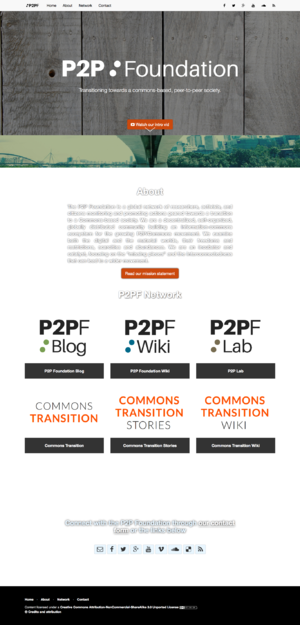P2P Foundation
Autodenifidos
The P2P Foundation is a global network of researchers, activists, and citizens monitoring and promoting actions geared towards a transition to a Commons-based society. We are a decentralized, self-organized, globally distributed community building an information-commons ecosystem for the growing P2P/Commons movement. We examine both the digital and the material worlds, their freedoms and restrictions, scarcities and abundances. We are an incubator and catalyst, focusing on the "missing pieces" and the interconnectedness that can lead to a wider movement. (http://p2pfoundation.net/)
Our mission
The P2P Foundation was conceived to help people, organizations and governments transition towards commons-based approaches to society through co-creating an open knowledge commons and a resilient, sustainable human network.
Between the paradigms of the network and the organization, the P2P Foundation exists as an ‘organized network’ which can facilitate the creation of networks, yet without directing them. Our primary aim is to be an incubator and catalyst for the emerging ecosystem, focusing on the ‘missing pieces’, and the interconnectedness that can lead to a wider movement.
P2P, in practice, is often invisible to those involved, for a variety of cultural reasons. We want to reveal its presence in discrete movements in order to unite them in their common ethos. To do this, a common initiative is required which:
* gathers information * connects and mutually informs people * strives for integrative insights contributed by many sub-fields * organizes events for reflection and action * educates people about critical and creative tools for “world-making”
We produce two blogs and several wikis, and organize activities so that people can connect and strengthen each other, and discuss topics of common interest. We are also creating alliances with other organizations to broaden our scope and abilities, and forging relationships with key people and public officers to extend our policy recommendations to those in the position to effect change within governments.
Strategic Priorities
Our aim is to be a pluralist network, actively documenting, researching, and promoting peer to peer alternatives. Our political aims may be summarized under the following maxims: - Ending biosphere destruction by abandoning dangerous conceptions of pseudo-abundance in the natural world (based on the assumption that natural resources are infinite) - Promoting free cultural exchange by abandoning innovation-inhibiting conceptions of pseudo-scarcity in the cultural world (based on the assumption that the free flow of culture must be restricted through excessive copyrights, etc.)
The following broad “streams” have been identified in order to best channel our efforts and resources:
Stream 1: Open Coops & Sustainable Livelihoods. Co-creating and catalyzing the alternative eco-system for open and cooperative peer production, to enable reconstruction of economic and social power around the commons. This includes work on our Commons-Based Reciprocity License (or Copyfair License), Open Cooperativism and Phyles, to create ethical entrepreneurial coalitions that co-produce commons.
Stream 2: P2P Culture and Politics. Reclaiming political voice and power via bottom-up Assemblies of the Commons and Chamber of the Commons putting forward social charters, in conjunction with “top-down” progressive coalitions through existing political parties. These coalitions around the commons, or ‘the politics and policies of the commons’, will further our efforts to implement Commons Transition Plans.
Stream 3: Building the Open Source Circular Economy. Creating synergies between cooperative peer production and sustainability, i.e. showing how a transition to the new modes of production, governance and ownership can solve the ecological and climate crises. (https://blog.p2pfoundation.net/portfolio/our-mission)
Descripción
P2P Foundation es una organización internacional dedicada a la promoción, investigación, estudio y documentación de modos alternativos de relaciones de colaboración. Fundada por Michael Bauwens, James Burke y Brice Le Blevennec en Amsterdam, es un lugar de encuentro para aquellos que comparten los principios, misiones y objetivos de la tecnología y la ideología P2P (peer-to-peer), los cuales plantean un cambio de conciencia en la participación en red. P2P se reconecta con tradiciones de orden cooperativo, creando un lenguaje empático con las nuevas generaciones digitales, combinando nuevos valores (subjetividad), nuevas relaciones (intersubjetividad) y una tecnología nueva (objetividad), así como nuevas formas de organización (interobjetividad).
Michael Bawuens ha propuesto los puntos clave de la política peer-to-peer. Propone cambios ante las principales problemas sociales producidos por el sistema social actual, cuya lógica de organización entiende como contraproducente al estar basada en un falso concepto de abundancia que ha creado un sistema de crecimiento infinito, con recursos finitos. Por otro lado, ha puesto límites y construido barreras para impedir la cooperación libre así como la innovación y experimentación social contínua.
P2P Foundation funciona a través de varios nodos en la web: un wiki, un blog, una red social y una lista de correos. Uno de sus objetivos es extender y proteger los bienes públicos a través de cambios en el régimen de propiedad intelectual, tal como han propuesto los movimientos Free software, Open source y Open Access. Además desarrolla diferentes proyectos, entre los cuales destacan:
- "Commons transition", una base de datos de experiencias prácticas y propuestas de políticas para una organización más humana y sostenible. En Mayo del 2014 se lanzaron 18 propuestas legislativas y una docena de proyectos piloto que fueron desarrollados y validados en el encuentro Buen Conocer, en Quito, Ecuador (http://cumbredelbuenconocer.ec/).
- "Distributed network", un sistema alternativo de organización que plantea una democracia no representacional en la que la gente sea capaz del manejo y gestión de su propia vida social y productiva a través de redes autónomas, interdependientes y organizadas en círculos, transformando así las relaciones en el sistema socioeconómico y político.
- "P2P Lab" es el sitio de investigación interdisciplinaria donde se realizan estudios y experimentos de tecnologías y prácticas open source. Aquí se producen soluciones tecno-económicas a nivel local, se escriben, editan y publican textos, se llevan a cabo eventos con estrategias educativas y proveen de consultoría y apoyo a organizaciones e instituciones para el uso de tecnologías abiertas.
Entrevistas
Alekos Pantazis http://dpya.org/wiki/index.php/Entrevista_a_Alekos_Pantazis
Michel Bauwens http://dpya.org/wiki/index.php/Michel_Bauwens
Publicaciones
Michel Bauwens (et al.) (2012) Synthetic Overview of the Collaborative Economy.
Enlaces
URL: http://p2pfoundation.net/Main_Page, http://p2pfoundation.net/
Wayback Machine: https://web.archive.org/web/*/http://p2pfoundation.net/Main_Page, https://web.archive.org/web/20160819220501/http://p2pfoundation.net/
Wikipedia: https://en.wikipedia.org/wiki/P2P_Foundation

